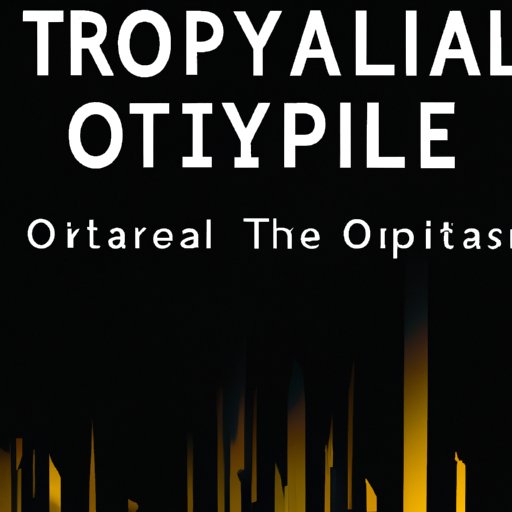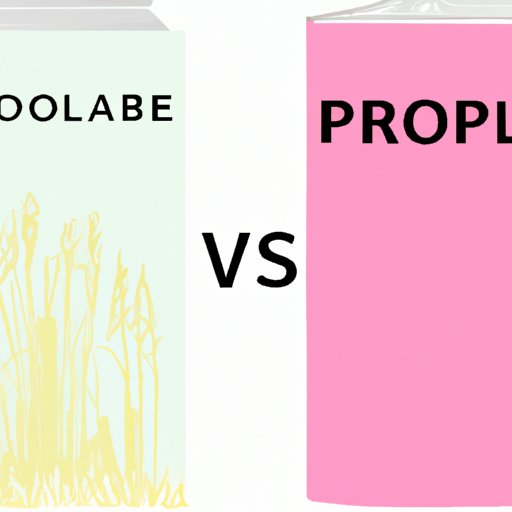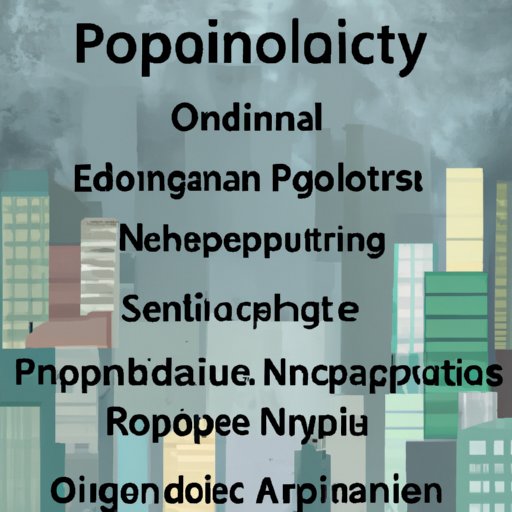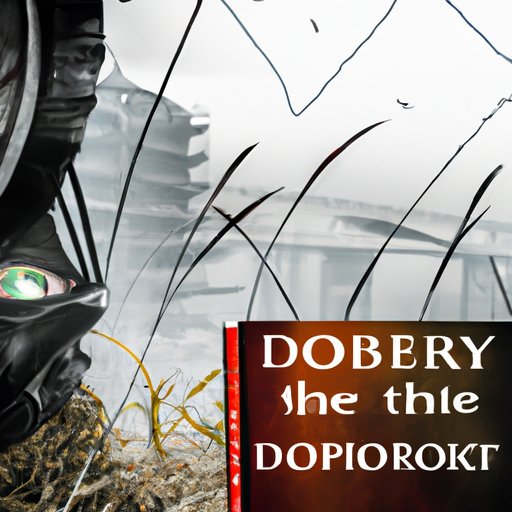Introduction
Dystopian literature is a genre of fiction that explores oppressive and often frightening societies. It is typically set in a future world where technology has advanced, yet the characters in the story are living in a totalitarian or authoritarian state. Dystopian literature can be classified as both science fiction and fantasy, though it often crosses over into other genres such as horror and romance. In recent years, dystopian literature has become increasingly popular, with many bestselling books and films being set in dystopian worlds.

A Comprehensive Guide to Dystopian Literature
The term “dystopia” was first coined in the late 19th century, but dystopian fiction has been around since the early 1700s. It is a genre of literature that focuses on the negative aspects of society, often using dark and depressing themes to explore a futuristic world where society has gone wrong. Dystopian literature can be used to warn readers of the potential dangers of unchecked technological advances and oppressive governments.
Exploring Dystopian Themes in Popular Literature
One of the most popular and influential dystopian authors is George Orwell, whose novel 1984 is perhaps the most famous example of dystopian literature. In this book, Orwell examines the dangers of an authoritarian government, exploring themes of surveillance, censorship, and propaganda. Other popular dystopian authors include Aldous Huxley, Ray Bradbury, Margaret Atwood, and Suzanne Collins. Each of these authors has explored different themes in their works, from environmental destruction and population control to class divisions and gender inequality.
An Analysis of the Most Influential Dystopian Authors
George Orwell’s 1984 is widely considered to be one of the most influential dystopian novels of all time. It has been credited with inspiring numerous works of dystopian fiction, including the Hunger Games trilogy by Suzanne Collins and the Maze Runner series by James Dashner. Orwell’s novel examines the power of language, examining how a totalitarian government can manipulate words to control its citizens. Aldous Huxley’s Brave New World is another influential work, exploring themes of genetic engineering, mind control, and consumerism.
Examining How Dystopian Fiction Reflects Society
Dystopian literature can often serve as a reflection of current events and social issues. For example, many dystopian works have explored themes of environmental destruction, reflecting the growing concern about climate change and global warming. Similarly, the Hunger Games trilogy has been interpreted as a commentary on economic inequality, with the wealthy ruling class oppressing the impoverished masses. By examining these themes in a futuristic setting, dystopian authors can help readers understand the dangers of certain social trends.

Comparing Dystopian and Utopian Literature
Although dystopian literature is often seen as the opposite of utopian literature, there are some similarities between the two genres. Both types of fiction explore possible futures for humanity, though utopian literature tends to focus on positive outcomes while dystopian literature focuses on negative ones. Utopian stories often involve individuals working together to create a perfect society, while dystopian stories often involve oppressive governments or corporations controlling the lives of their citizens.
Overview of the Differences Between Dystopian and Utopian Genres
One of the key differences between dystopian and utopian literature is the tone of the stories. Utopian stories tend to be optimistic and hopeful, while dystopian stories are often bleak and pessimistic. Additionally, dystopian stories often involve violence and suffering, while utopian stories typically avoid such themes. Finally, dystopian stories often focus on a single individual or group of individuals standing up against oppressive forces, while utopian stories typically focus on larger societal changes.
Examining the Common Themes of Dystopian and Utopian Fiction
Despite their differences, both dystopian and utopian literature often explore similar themes. These include themes of power and control, freedom and oppression, and technology and progress. Additionally, both genres often examine the effects of capitalism, socialism, and other political ideologies on society. Ultimately, both genres can be used to examine current social issues and to offer insight into our own society.

An Overview of Dystopian Genres
Dystopian literature can take many forms, ranging from novels to films and television shows. The most popular genres of dystopian fiction include science fiction, fantasy, horror, and romance. Science fiction stories often involve advanced technology and futuristic settings, while fantasy stories involve magical elements and mythical creatures. Horror stories usually involve supernatural or apocalyptic elements, while romance stories may explore themes of love and relationships in a dystopian world.
Science Fiction
Science fiction is one of the most popular genres of dystopian literature. It typically involves advanced technology, interplanetary travel, and futuristic settings. Examples of science fiction dystopias include the Matrix trilogy, Blade Runner, and 1984. These stories often examine the dangers of unchecked technological advancement and the potential consequences of a society ruled by machines.
Fantasy
Fantasy stories involve mythical creatures and magical elements, often set in a medieval or post-apocalyptic world. Examples of fantasy dystopias include The Hunger Games trilogy, The Handmaid’s Tale, and The Lord of the Rings. These stories often explore themes of freedom and oppression, as well as the consequences of unchecked power.
Dystopian Horror
Dystopian horror stories typically involve supernatural or apocalyptic elements, such as zombies or monsters. Examples of dystopian horror stories include the Resident Evil franchise, I Am Legend, and World War Z. These stories often explore the dangers of unchecked scientific experimentation and the potential consequences of a chaotic and violent world.
Dystopian Romance
Dystopian romance stories involve protagonists struggling to find love in a hostile and oppressive world. Examples of dystopian romance stories include The Hunger Games trilogy, Delirium by Lauren Oliver, and Divergent by Veronica Roth. These stories often explore themes of forbidden love and the power of emotion in a world where emotions are suppressed.
How to Write Dystopian Fiction
Writing a dystopian story can be a challenging yet rewarding endeavor. To get started, it’s important to understand the core elements of a dystopian story. These include a futuristic setting, oppressive government or corporation, and a protagonist who struggles to survive and find freedom in a hostile world.
Understanding the Core Elements of a Dystopian Story
The first step in writing a dystopian story is to create a believable and compelling world. This can be done by researching current events and social issues, as well as examining the effects of unchecked power and technology. It’s also important to consider how a dystopian society would differ from our own, exploring what values and beliefs would be upheld and which would be suppressed.
Developing Characters and Plot Points
Once you’ve created your dystopian world, it’s time to develop characters and plot points. Start by creating a protagonist who will struggle against the oppressive forces in your story. Then, create antagonists who will stand in the way of your protagonist’s goals. Finally, create a series of conflicts and challenges that your protagonist must face in order to reach their ultimate goal.
Crafting a Dystopian World
The last step in writing a dystopian story is to craft a believable and immersive world. This can be done by researching current events and social issues, examining the effects of unchecked power and technology, and considering how a dystopian society would differ from our own. Additionally, it’s important to consider how technology and other advancements would affect the daily lives of citizens in your story.
Conclusion
Dystopian literature is a genre of fiction that explores oppressive and often frightening societies. It has been around for centuries, with authors such as George Orwell and Aldous Huxley exploring themes of surveillance, censorship, and propaganda in their works. Dystopian literature can be used to warn readers of the potential dangers of unchecked technological advances and oppressive governments, as well as to examine current social issues in a futuristic setting. It is a genre that continues to evolve and grow, with new authors and stories offering unique perspectives on our own society.
Summary of Dystopian Literature
Dystopian literature is a genre of fiction that explores oppressive and often frightening societies. It typically involves advanced technology, oppressive governments or corporations, and a protagonist who struggles to survive in a hostile world. It is a genre that has been around for centuries, with authors such as George Orwell and Aldous Huxley examining the dangers of unchecked power and offering insight into our own society.
Reflection on the Impact of Dystopian Fiction
Dystopian literature can be used to warn readers of the potential dangers of unchecked technological advances and oppressive governments, as well as to examine current social issues in a futuristic setting. It is also a genre that continues to evolve and grow, with new authors and stories offering unique perspectives on our own society. Ultimately, dystopian literature can be a powerful tool for understanding our own world and imagining a better future.
(Note: Is this article not meeting your expectations? Do you have knowledge or insights to share? Unlock new opportunities and expand your reach by joining our authors team. Click Registration to join us and share your expertise with our readers.)
